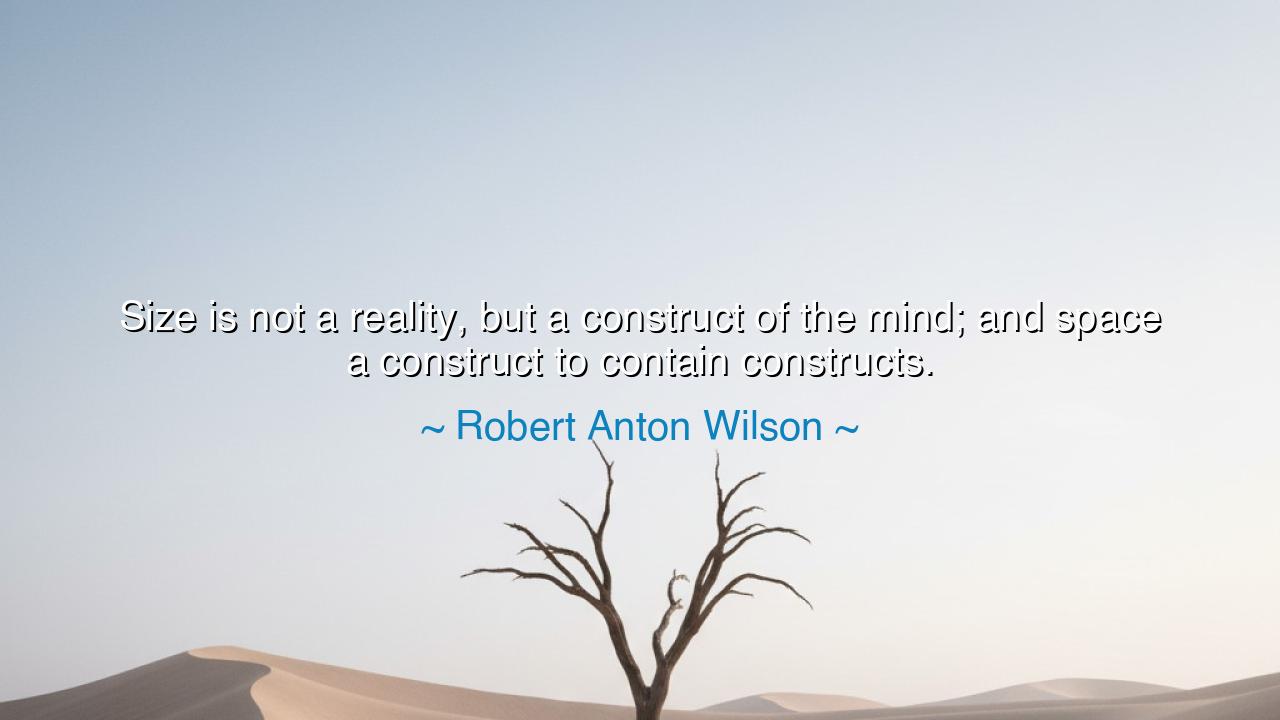
Size is not a reality, but a construct of the mind; and space a
Size is not a reality, but a construct of the mind; and space a construct to contain constructs.






The words of Robert Anton Wilson echo like a riddle from the lips of an oracle: “Size is not a reality, but a construct of the mind; and space a construct to contain constructs.” At first, such words may seem woven of paradox, but within them lies a vision both humbling and exalting. For they tell us that the vastness of heaven and the minuteness of dust are not realities in themselves, but patterns traced by the mind that seeks order in the great mystery. What we call size, what we call space, are measures invented by thought, fragile cages we build around the infinite.
The ancients gazed at the stars and saw gods, thrones, and chariots of fire; the modern sage peers through lenses of glass and finds galaxies without number. Yet whether in myth or in science, it is the same mind that stretches itself outward, trying to grasp the immeasurable. The truth that Wilson unveils is this: reality is not bound by the grids of our measurements. The lion is no less mighty because the ant is small; the atom is no less wondrous because the galaxy is vast. Size is a garment draped by perception, not the flesh of truth itself.
Recall the tale of Galileo, who lifted his eye to the heavens with a telescope. Men had thought the moon a perfect sphere, unmarred and divine. But through his instrument, he beheld mountains and craters. Suddenly, the mighty moon was made imperfect, familiar, almost earthly. Was the moon changed? No—it was the mind’s construct that shifted. The size of truth expanded because perception expanded. Thus, what seemed eternal and absolute dissolved when touched by a new way of seeing.
So too in the life of man. A child believes a year to be an eternity; an elder feels a decade pass like the flicker of a candle. The hour is no different, the measure no shorter. It is the mind’s construct that changes, reshaping time and space according to the weight of experience. A prison cell may be infinite torment to one man, yet a cloistered sanctuary to another. Here is the essence of the teaching: it is not space itself that defines us, but how we fill it with thought, with meaning, with spirit.
This vision is both liberating and perilous. Liberating, because it tells us that boundaries are not as rigid as they seem. The horizon is not the end of the world, only the edge of what the eye can see. Perilous, because it warns us that much of what we cling to—our sense of vast and small, our judgments of near and far—are but illusions spun by habit. To mistake these for reality is to live in a dream, confusing the cage for the sky.
O children of the future, hear this: space is the canvas, but it is the mind that paints. If you believe the walls of your circumstance are unbreakable, they will bind you. But if you see them as constructs, they may dissolve like mist before the sun. Alexander, called the Great, was told by his tutors that the world ended beyond the Indus. Yet he refused the prison of their map. He marched beyond it, and though his empire crumbled with time, his vision showed that the space of human endeavor is without end.
Therefore, let us live not as captives of constructs, but as their masters. Question what you see, and know that what appears large may be small in another light, and what appears small may hold worlds within it. The ant builds a kingdom beneath the soil; the star is but a flicker when compared to the vast dark in which it burns. Reality is the song of all things together, not the measures by which we divide them.
The lesson is this: do not fear space, do not be humbled by size. Instead, turn inward to the power of perception, and outward to the endless horizon of possibility. In your daily life, when faced with a task that seems too great, remember—it is only a construct of the mind. Break it into steps, and the mountain becomes a path. When confined to narrow circumstances, remember—the walls are only lines drawn by thought. Fill them with purpose, and even the smallest room becomes a temple. Thus, you will be free not by escaping space, but by mastering the constructs that bind your sight.






AAdministratorAdministrator
Welcome, honored guests. Please leave a comment, we will respond soon